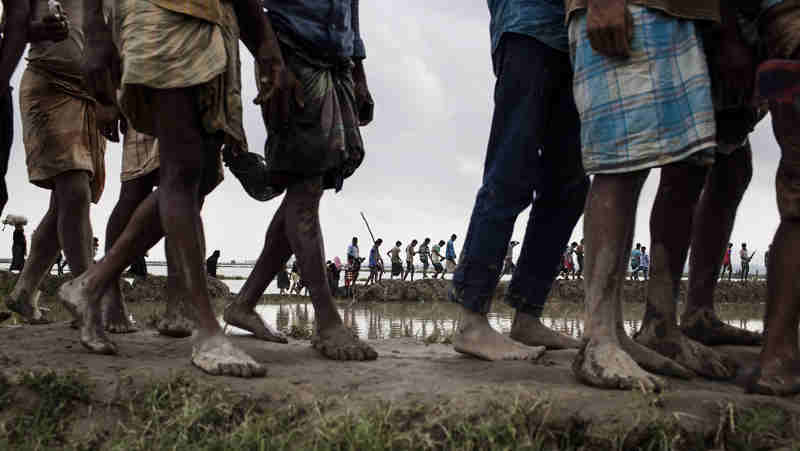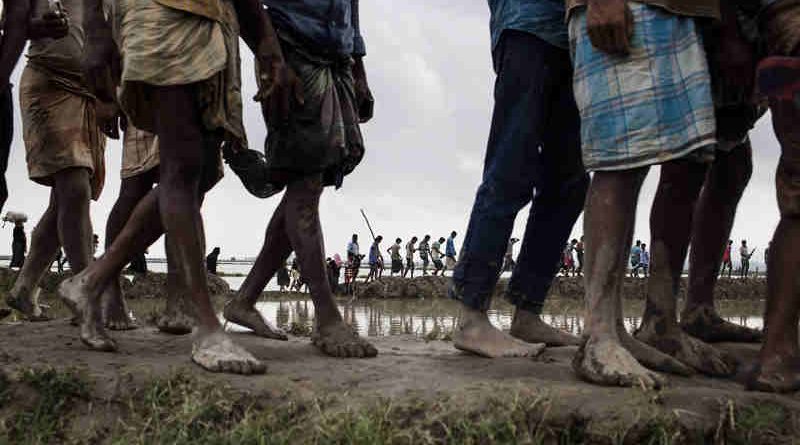58 NGOs Urge U.S. to Impose Economic Sanctions on Burma

Fifty-eight NGOs have written a letter to the U.S. Secretary of State Rex Tillerson and Secretary of the Treasury Steven Mnuchin to impose targeted economic sanctions on Burma (a.k.a. Myanmar).
In the letter, the NGOs suggest that the U.S. government needs to act urgently to help address the grave human rights and humanitarian crisis that has resulted from the Burmese military’s brutal response to the Arakan Rohingya Salvation Army (ARSA)’s August 25 attack on government posts in Burma’s Rakhine State.
According to the letter, since late August, Burmese security forces have waged a campaign of ethnic cleansing and committed numerous crimes against humanity against the Rohingya population, a long-persecuted ethnic and religious minority group predominantly in Rakhine State. In response to these abuses, more than 600,000 Rohingya have fled to Bangladesh over the past two months.
[ Brutal Attacks on Rohingya: “We Will Torch Your Houses and Kill You.” ]
Satellite images commissioned by independent organizations show hundreds of burned villages – and tens of thousands of torched buildings. Refugees have provided first-hand accounts of unfathomable brutality: soldiers burning infants alive, gang-raping women, shooting villagers fleeing their homes – violations that research by non-governmental organizations (NGOs) has found to be widespread and systematic.
Meanwhile, United Nations investigators who have conducted interviews of Rohingya refugees in Bangladesh have noted “a consistent, methodical pattern of actions resulting in gross human rights violations affecting hundreds of thousands of people.”
The UN High Commissioner for Human Rights, Zeid Ra’ad al Hussein, has called the scale and nature of the atrocities in Rakhine a “textbook example of ethnic cleansing.”
[ Corruption and Hindu Terror Increasing in India: 2017 World Report ]
Despite international condemnation, Burmese authorities continue to restrict access to the region for most international humanitarian organizations, a UN fact-finding mission, and independent media. The commander-in-chief of the Burmese military, Senior General Min Aung Hlaing, and other Burmese officials, refuse to acknowledge the atrocities their forces have committed, it was stated in the letter.
“It is critical that the U.S. government respond to the severity and scope of the Burmese military’s ethnic cleansing campaign with effective action. To this end, we urge the administration to immediately and robustly impose targeted economic sanctions authorized under the 2008 JADE Act and the 2016 Global Magnitsky Human Rights Accountability Act,” the NGOs said in the letter.
[ PM Modi Unleashed Tax Terror in India: Says Manmohan Singh ]
Under the JADE Act, according to the NGOs, the president is empowered to issue travel restrictions and financial sanctions against Burmese military officials and their immediate family members if they are “involved in…gross violations of human rights in Burma or in the commission of other human rights abuses.”
Steps taken by the previous administration to lift sanctions did not unravel existing authorities but only waived them, and, according to recent State Department releases, some JADE Act authorities are currently in use, such as the ban on current and former Burmese military officials traveling to the United States. The administration should move to robustly and vigorously employ the remaining authorities, the NGOs suggested.
In addition to the JADE Act, the administration should exercise its authority granted under the Global Magnitsky Act, which allows for the levying of travel restrictions and financial sanctions against individuals responsible for acts of significant corruption and gross violations of internationally recognized human rights committed against individuals who seek “to obtain, exercise, defend, or promote internationally recognized human rights and freedoms, such as the freedom of religion.”
Given that the Burmese military’s actions against the Rohingya people are motivated at least in part on religious grounds, the Global Magnitsky Act is applicable, it was said in the letter which appeared on the Freedom House website.





